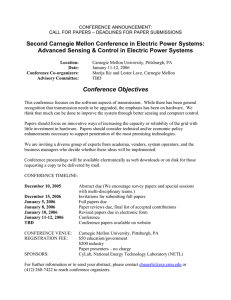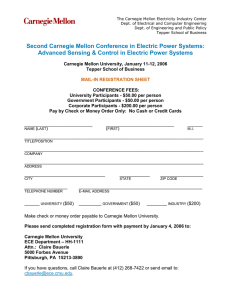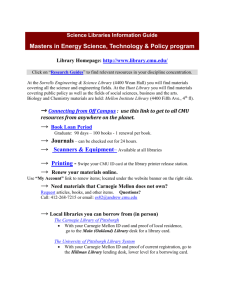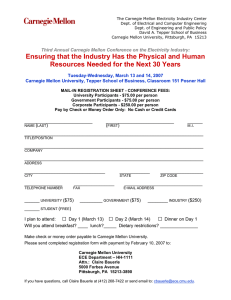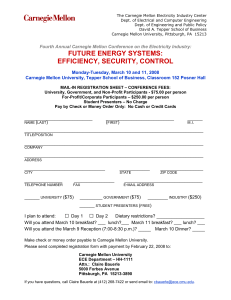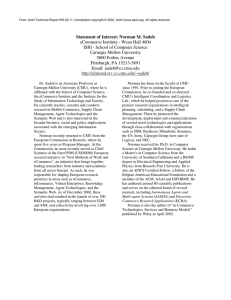ABSTRACT: 2014 ELATE Institutional Action Project Poster Symposium
advertisement
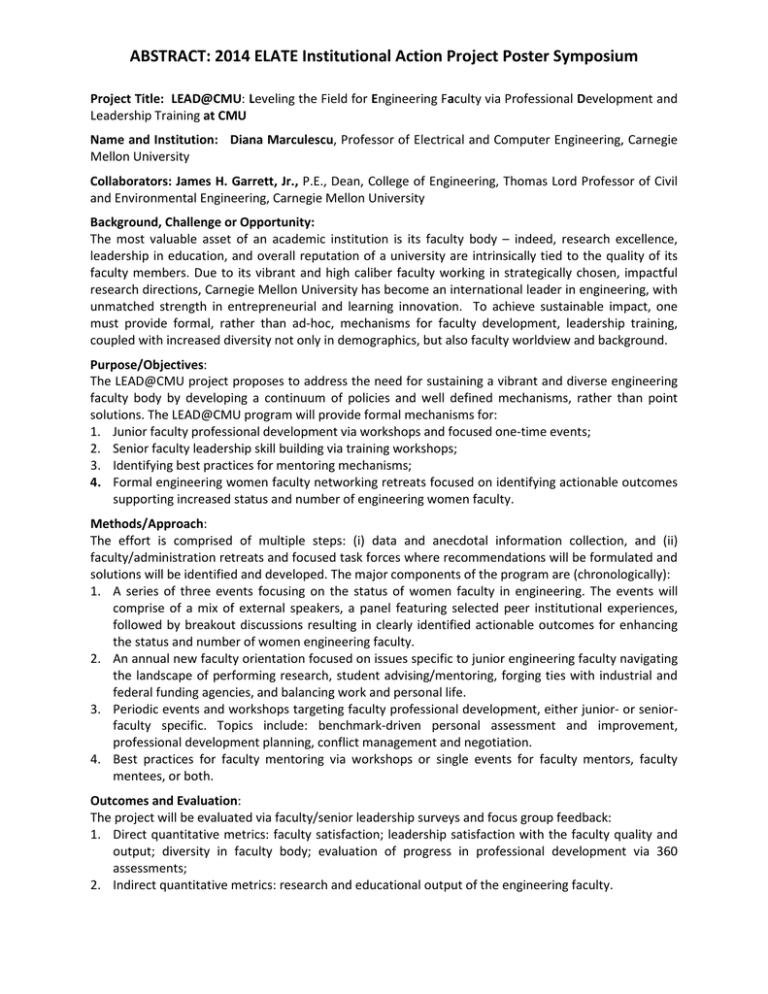
ABSTRACT: 2014 ELATE Institutional Action Project Poster Symposium Project Title: LEAD@CMU: Leveling the Field for Engineering Faculty via Professional Development and Leadership Training at CMU Name and Institution: Diana Marculescu, Professor of Electrical and Computer Engineering, Carnegie Mellon University Collaborators: James H. Garrett, Jr., P.E., Dean, College of Engineering, Thomas Lord Professor of Civil and Environmental Engineering, Carnegie Mellon University Background, Challenge or Opportunity: The most valuable asset of an academic institution is its faculty body – indeed, research excellence, leadership in education, and overall reputation of a university are intrinsically tied to the quality of its faculty members. Due to its vibrant and high caliber faculty working in strategically chosen, impactful research directions, Carnegie Mellon University has become an international leader in engineering, with unmatched strength in entrepreneurial and learning innovation. To achieve sustainable impact, one must provide formal, rather than ad-hoc, mechanisms for faculty development, leadership training, coupled with increased diversity not only in demographics, but also faculty worldview and background. Purpose/Objectives: The LEAD@CMU project proposes to address the need for sustaining a vibrant and diverse engineering faculty body by developing a continuum of policies and well defined mechanisms, rather than point solutions. The LEAD@CMU program will provide formal mechanisms for: 1. Junior faculty professional development via workshops and focused one-time events; 2. Senior faculty leadership skill building via training workshops; 3. Identifying best practices for mentoring mechanisms; 4. Formal engineering women faculty networking retreats focused on identifying actionable outcomes supporting increased status and number of engineering women faculty. Methods/Approach: The effort is comprised of multiple steps: (i) data and anecdotal information collection, and (ii) faculty/administration retreats and focused task forces where recommendations will be formulated and solutions will be identified and developed. The major components of the program are (chronologically): 1. A series of three events focusing on the status of women faculty in engineering. The events will comprise of a mix of external speakers, a panel featuring selected peer institutional experiences, followed by breakout discussions resulting in clearly identified actionable outcomes for enhancing the status and number of women engineering faculty. 2. An annual new faculty orientation focused on issues specific to junior engineering faculty navigating the landscape of performing research, student advising/mentoring, forging ties with industrial and federal funding agencies, and balancing work and personal life. 3. Periodic events and workshops targeting faculty professional development, either junior- or seniorfaculty specific. Topics include: benchmark-driven personal assessment and improvement, professional development planning, conflict management and negotiation. 4. Best practices for faculty mentoring via workshops or single events for faculty mentors, faculty mentees, or both. Outcomes and Evaluation: The project will be evaluated via faculty/senior leadership surveys and focus group feedback: 1. Direct quantitative metrics: faculty satisfaction; leadership satisfaction with the faculty quality and output; diversity in faculty body; evaluation of progress in professional development via 360 assessments; 2. Indirect quantitative metrics: research and educational output of the engineering faculty. LEAD@CMU: Leveling the Field for Engineering Faculty via Professional Development and Leadership Training at CMU Diana Marculescu Presented at the 2014 ELATE® Leaders Forum Professor of Electrical and Computer Engineering Carnegie Mellon University Vision Challenge and Opportunity For sustainable impact, support is needed for: Formal mechanisms for faculty development and leadership training Increased diversity not only in demographics, but also faculty worldview and background. Where Are We? Vibrant, high quality faculty New orientation for junior engineering faculty Best practices for faculty mentoring Nurture & Grow Retreat series for addressing issues facing women faculty Teaching excellence Faculty support and development Faculty development workshops Professional development planning Managing others and self Innovation and entrepreneurship Develop & Support Balance and Diversity Most valuable asset of an academic institution is its faculty body CMU is an international leader in engineering, with unmatched strength in entrepreneurial and learning innovation Expected Outcome and Assessment Short- and long-term actionable objectives 1 in 12 Dept. heads Faculty Grad students Diversity: “leaky” pipeline 1 in 6 Faculty Engagement Need: actionable objectives addressing it Faculty development Endwd. profs. Women in engineering Need: formal support to enable higher research, educational, entrepreneurial impact New faculty Women faculty retreats & events Review Discuss Adapt Fall surveys and assessments Personal development and 360 benchmarks Annual diversity analysis Periodic surveys Indirect metrics: Improved Research, education, and entrepreneurial faculty output Institutional image James H. Garrett, Jr., P.E., Dean, College of Engineering, Thomas Lord Professor of Civil and Environmental Engineering, Carnegie Mellon University Shelley Anna, Professor of Mechanical Engineering and Chemical Engineering, Carnegie Mellon University Need: best practices exchange 1 in 4 Assessed by Collaborators Review Discuss Adapt Mentoring: all engineering depts. Leadership competencies in faculty body Number of women faculty Satisfaction of faculty with mentoring experience Satisfaction of senior administration with faculty body Faculty quality of life Internal and external faculty recognition/awards External institutional image presence Spring surveys and assessments Need: include research/others Assessed by Approach Faculty orientation: teaching only Direct metrics: Increased Faculty Engagement Acknowledgments Margaret Kupferle, U. of Cincinnati Sue McNeill, U. Delaware Jan Naegele, Wesleyan U. Elena Naumova, Tufts U. Anne Robertson, U. of Pittsburgh Hong Tan, Purdue U. For feedback and support


